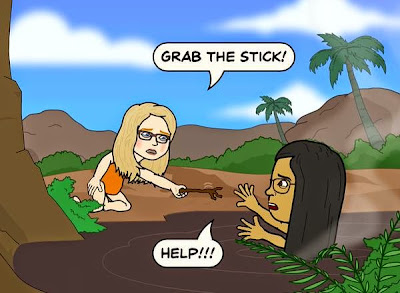There is a lot of conversation on college and university campuses about getting undergraduates involved in research as soon as possible. It is clear that the close contact with faculty as well as more experienced students is a high impact experience and is positively correlated with graduation and shorter time to degree. At UT Austin, this emphasis on undergraduate research seems to be a main plank in our new president's platform. It has been a central topic in the Campus Conversations, which the president sponsored over this past year in his role as the Provost. There are many different initiatives on campus, particularly in STEM fields, which already focus on this effort, including the Freshman Research Initiative in the College of Natural Sciences. My own home, the College of Liberal Arts, briefly had a program for freshmen and sophomores, whereby students could work with a faculty member on a project connected to the faculty's research program. I worked with a couple of students through this program but, ultimately, found it to be an exercise in futility. The students who were eligible had no language training and my research absolutely requires knowledge of Latin as a sine qua non. Even the task of constructing a bibliography requires more than a knowledge of English. I struggled to devise interested but manageable tasks for the students; and I think they left the experience wondering why anyone would want to do research in Classics!
In liberal arts, and especially in the field of Classics, the major obstacle to involving undergraduates--especially early undergraduates--is that they lack the specific skills that are necessary to do even the most basic research. Classics training at the undergraduate level focuses on language instruction, and it typically takes a student most of their undergraduate years to even master Latin and/or Greek to a level where they can begin to make sense of an ancient text. Very often, research is postponed to graduate training, even the PhD these days. Given this, it is a real challenge to think about how to bring inexperienced undergraduates into the faculty research process. In truth, it can't really happen for a scholar who produces the kind of scholarship I do.
This is not to say that I cannot engage in productive conversations about research with undergraduates; or have them learning some of the "skills of the trade" in my company. As I learned during the production of Online Rome, though, the best place for this to happen--for me, given the kind of research I do--is around teaching. It is my sense that the value for students in engaging in research early in their undergraduate career is not research qua research so much as it is, first, structured contact with faculty as well as, ideally, more senior graduate and undergraduate students who can act as peer mentors; second, an opportunity to see the application of knowledge (I don't think it's particularly relevant whether the application occurs in a research or a teaching environment); and third, an opportunity to see "behind the curtain" of academia, to see what it is that professors do and what it means to be a professor. This third element is especially important for students in liberal arts who think they might want to continue their study of the field as graduate students.
When I was putting together a team of students to work with me on building Online Rome last summer, I included an advanced undergraduate student (a double major in Classics and Religion). In retrospect, I wish I'd included more. It was fascinating to see how, in giving her the task of creating a first draft for one of the modules, we were able to have deep and engaged conversations about the content, how best to present it, what sorts of trends it connected to, etc. Whereas I feel like any effort I have made to involve undergraduates in my research has ultimately meant that they are doing uninteresting "grunt" work, this project allowed for genuine intellectual growth. The key was the fact that it was project-based for the student. She worked on it and then we discussed the work. In the future, I hope very much to involve a larger team of undergraduates in a course-building project. In liberal arts, and especially in Classics, it is an ideal way to connect with undergraduates on intellectual grounds, but at a level that is accessible to them (because the task is not the production of original research but, instead, how to teach complicated content to their peers); and which results in the production of something tangible and useful.
I've never been much of a fan of the "hack the syllabus" approach to undergraduate teaching, primarily because it doesn't work terribly well with the particular audiences I teach. What does work is involving a group of students in the design and build of a course from the very start. I can imagine a very interesting learning experience in which, for one semester, a group of students works with me to design and build a course. The following semester, we would teach that course, with the student builders acting as peer mentors to the enrolled students. In this way, it would be possible to put more experienced students together with less experienced students--something that happens to great benefit in graduate seminars but is nearly impossible to do in undergraduate classics courses (in part because, through an odd system of incentives, nearly all students in upper division "seminar" courses are non-majors).
At present, I have only involved undergraduates in the delivery of Intro to Ancient Rome/Online Rome as graders. It's not a bad job and it is enormously helpful to the instructional team, especially when we are teaching very large numbers of students and need to turn around the exams quickly. The course instructor graded 10-15 short answer sections on the exams, to establish a rubric. The instructor then met with the graders, reviewed the rubric and scoring of points (with attention to common errors and breakdown of points for each question). Without exception, the undergraduates did an excellent job and were very attentive and punctual. They more than earned their stipend. The job offered an opportunity to engage with the instructor and to see a bit how large courses are run.
I am a much bigger fan of peer mentors in the classroom. I saw them
used to excellent effect in my colleague Cynthia LaBrake's Intro to
Chemistry course. I wish that I had had the funds to create a more
elaborate network of peer mentors for Online Rome. This is one aspect of the Online Rome course that could be developed. Especially in the online class, putting current students in contact with former, successful students would go a long way towards helping the new students figure out how to take an online class and, in particular, how to do well in Online Rome. Online bulletin boards/Rate My Professor-like sites can offer some information, but it tends to reflect narrow points of view. It would be much more effective to have a group of former, successful students who act as mentors and graders. If some effort were made to meet weekly with these peer mentors, it would also be an excellent way to sharpen and expand the mentors' content knowledge as well as their ability to explain complicated concepts to their peers. There is really a great opportunity here, especially for Classics and related majors, if the funding can be found and if someone is willing to spend the time developing and running such a program.


No comments:
Post a Comment